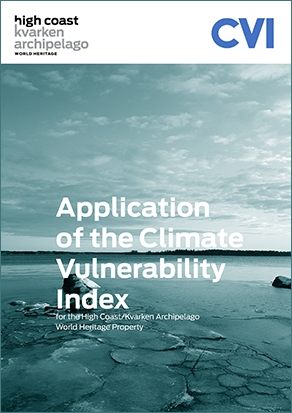Application of the Climate Vulnerability Index for the High Coast / Kvarken Archipelago World Heritage Property
Climate change has been identified as the fastest-growing threat to World Heritage (WH) and many WH properties are already experiencing related effects. This has resulted in significant negative impacts, damage and degradation to the properties, as well as to the communities associated with them. As the climate crisis intensifies, there remains an urgent need to understand the climate vulnerability of the world’s natural and cultural heritage.
The High Coast/Kvarken Archipelago WH property reflects a landscape that is already constantly changing – post-glacial land uplift means today there is 1% more land than there was in 2006. However, impacts of climate change are also occurring.
This report describes the outcomes from an application of the Climate Vulnerability Index (CVI) for the High Coast/Kvarken Archipelago. The CVI methodology is a technique to rapidly assess the vulnerability of natural and cultural WH, assessing the realised and potential impacts to (i) the values that collectively comprise the Outstanding Universal Value (OUV) of the property; and (ii) the associated community.
Climate change is expected to threaten the resilience of some areas more than others in the High Coast/Kvarken Archipelago and to increasingly impact upon some of the values that collectively contribute to the OUV. Biological values were considered more vulnerable to impacts from climate change than geological values. The identified levels of vulnerability emphasise the importance of developing effective strategies for climate change adaptation in the WH property. It also highlights the value of local knowledge and experience not only for the local area, but also nationally and internationally.
Funding support for this project was provided by Interreg Botnia-Atlantica.
